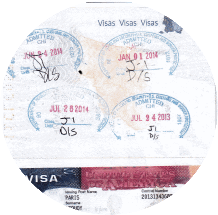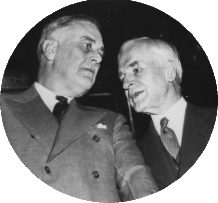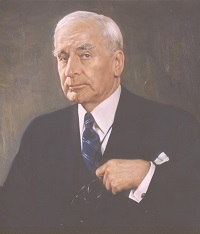 BIOGRAPHY
BIOGRAPHY
1871-1955
Cordell Hull, 1945 Nobel Peace Prize winner, was best known as “Father of the United Nations.” A renowned American statesman, he served longer than any other Secretary of State (12 years) under President Franklin Roosevelt, who bestowed upon him the title “Father of the United Nations” for his unstinting and ultimately successful efforts to create an international forum for nations to meet and solve problems. Though the Secretary shunned the limelight, his work remains a shining example of how much progress can evolve from the vision of one man.
MAJOR ACCOMPLISHMENTS
1945 Nobel Prize for Peace as “Father of the United Nations”
1933 – 1944 Longest-serving Secretary of State for 12 years
1930 – 1933 United States Senator
1921 – 1923 President of the Democratic Party National Committee
1907 – 1931 Congressman in U.S. House of Representatives
Served 18 years on the House Finance Committee
1903 – 1907 Federal Judge
Cordell Hull’s vision of a new era of human progress, as primary architect of the structure of the United Nations, will continue to evolve. President Franklin D. Roosevelt, who dubbed the Secretary “Father of the United Nations,” nominated him for the Nobel Prize for Peace award in 1945, Cordell Hull’s major achievement, culminating long years of effort and struggle to establish a neutral venue providing common ground where countries may convene and engage in peaceful dialogue over disputes. During his long tenure as Secretary of State in U.S. History – serving for 12 years, a distinction no other U.S. statesman has ever attained – he was unable to prevent World War II and strove for the remainder of his term to create solutions to the horrors of war and the devastating after-effects of the Depression done to his beloved country. After Franklin Roosevelt left office, Presidential terms were limited to eight years, and since then no other President – or Secretary of State – has held office for more than two 4-year terms(eight years). Some parting words of Cordell Hull:
“I am firmly convinced that in the world of today all nations will be forced to the conclusion that cooperation for law, justice, and peace is the only alternative to a constant race in armaments–including atomic armaments–and to other disruptive practices that will bring the nations participating in them on either side to a common ruin, the equivalent of universal suicide.”
“I conclude these Memoirs with the abiding faith that our destiny as a nation is still before us, not behind us. We have reached maturity, but at the same time we are a youthful nation in vigor and resource, and one of the oldest of the nations in the unbroken span of our form of government. The skill, the energy, the strength of purpose, and the natural wealth that made the United States great are still with us, augmented and heightened. If we are willing from time to time to stop and appreciate our past, appraise our present and prepare for our future, I am convinced that the horizons of achievement still stretch before us like the unending Plains. And no achievement can be higher than that of working in harmony with other nations so that the lash of war may be lifted from our backs and a peace of lasting friendship descend upon us.”
The United Nations has provided a vessel to achieve the Secretary’s noble goals.
THE SEEDS OF THE UNITED NATIONS
Shortly after the outbreak of World War II, Secretary Hull proposed the formation of a new world organization in which the United States would participate after the war. To accomplish this aim, in 1941 Hull formed the Advisory Committee on Postwar Foreign Policy. It was composed of both Republicans and Democrats. Mindful of President Wilson’s failure with the League of Nations, Hull took pains to keep all discussion of the organization nonpartisan. As various plans were considered, Hull argued for an international structure rather than a system of regional groups, a plan that eventually prevailed. By August, 1943, the State Department drafted a document titled Charter of the United Nations, which became the basis for proposals submitted by the United States at the 1944 Dumbarton Oaks Conference. Ill health forced Hull to resign from office on 27 November, before final ratification of the United Nations Charter occurred in San Francisco the following year. Sec. Hull served as a member of the United States’ delegation to the San Francisco Conference, and ever the diplomat, acceded to a senator who would be important to the ratification of the Charter. President Roosevelt praised Hull as “the one person in all the world who has done the most to make this great plan for peace an effective fact.”
By the time he resigned in 1944 due to ill health, he had occupied the important post of Secretary of State for almost twelve years, the longest tenure in American History. Prior to Secretary Hull’s resignation, Roosevelt offered to him the Vice Presidency in the President’s last bid for re-election. Because of ill health, Hull declined and Harry Truman became Vice President.
Most historians believe that, had Roosevelt not run for a third and fourth term, Hull could likely have been elected President of the United States.
THE NOBEL PEACE PRIZE
Following nomination by Roosevelt, the Norwegian Nobel Committee presented the 1945 Nobel Prize for Peace to Cordell Hull in recognition of his work in the Western Hemisphere, international trade agreements, and efforts toward establishment of the United Nations. Too ill to personally receive the award, Hull sent a brief acceptance speech delivered by Lithgow Osborne, the United States ambassador to Norway. Hull wrote:
“Under the ominous shadow which the Second World War and its attendant circumstances have cast on the world, peace has become as essential to civilized existence as the air we breathe is to life itself. There is no greater responsibility resting upon peoples and governments everywhere, than to make sure that enduring peace will this time … at long last … be established and maintained … The searing lessons of this latest war and the promise of the United Nations Organization will be the cornerstones of a new edifice of enduring peace and the guideposts of a new era of human progress.”
HULL’S SECRETARY OF STATE YEARS
In 1906 Cordell Hull was elected to the United States House of Representatives, where he served (with the exception of two terms) until 1931. He was defeated in the election of 1922 in the McKinley landslide. While out of office for four years, he continued as Chairman of the Democratic National Committee from 1921 to 1924, being one of the most powerful voices for the southern wing of the Democratic party. Instrumental in enacting fiscal reform during a progressive era, he aligned himself with Woodrow Wilson’s bloc of Southern supporters. During Wilson’s first term as president, Hull helped draft the 1913 Underwood-Simmons Tariff Act and the 1916 inheritance law. After the United States entered World War I, he contributed to financial legislation enabling U.S. participation in the war. In 1919 he took part in drafting the victory loan law which helped liquidate the national debt.
Hull strongly shared President Wilson’s idealistic international outlook, becoming one of the first and most vigorous supporters of the League of Nations. With economic ideas rooted in nineteenth-century liberalism, he believed that economic nationalism was a major cause of war. He opposed Herbert Hoover’s high tariff policy. During his distinguished career in Congress, Hull served as a member of the powerful House Ways and Means Committee for eighteen years, the leader of the movement for low tariffs, as well as the drafter of a resolution providing for the convening of a world trade agreement congress at the end of World War I. He became a recognized expert in commercial and fiscal policies.
Elected to the U.S. Senate in 1930 for the 1931-37 term, Hull was an important figure at the 1932 Democratic Convention, authoring major portions of the Democratic platform, including a low-tariff plank. In 1933 he relinquished his Senate seat at the age of 62 to become President Franklin D. Roosevelt’s Secretary of State, an appointment which surprised many but kept with President Roosevelt’s placing of powerful party allies in his cabinet rather than resorting to bureaucratic technicians. As the acknowledged and powerful leader of the critical Southern wing of the Democratic party with strong support in Congress, Hull proved to be a logical choice.
According to Raymond Moley, an FDR Brain Truster who became Under-Secretary of State, a coalition of five powerful senators of the time voiced concern over Hull’s appointment as Secretary of State. Hull, it was said, knew little of foreign affairs and was adamant on the issue of tariff reduction. The anti-Hull coalition protested that he was unlikely to acquire a sufficiently broad view to communicate with the Senate. Further, it was widely known that Hull did not work smoothly with others. When this fact was conveyed to President Roosevelt, the legend has it that he listened in silence. The President then answered, “So…well, you tell the senators I’ll be glad to have some fine idealism in the State Department.” As it occurred, Hull came to be regarded as the most respected and popular figure among the officers of all of President Roosevelt’s cabinets. Indeed inexperienced in diplomatic affairs, Hull (with his white hair, dignified bearing, and habit of speaking in absolutes) inspired trust. Nevertheless, “Today nearly all the nations of the world, including our own, have no fundamentals, either political, moral or economic,” he thundered in his first speech as Secretary of State. Adhering to Wilsonian principles, Hull assumed that the correct ideals held the key to world peace and mutual cooperation.
Hull’s accomplishments as a member of Roosevelt’s cabinet revived several themes of Wilson’s administration: Friendly relations with Latin America and the establishment of an international organization under world law. He was involved in passing the reciprocal trade program in June 1934 under the Trade Agreements Act. Hull believed that expansion of trade would reduce international tensions and negotiated reciprocal trade agreements with twenty-two nations. This was part of his strategy to establish communication, dialogue and cooperation with other countries of the world. Though some organizations stress the importance of Hull’s trade policy, the Cordell Hull Foundation does not include it in his top two most important accomplishments: Secretary of State for 12 years under FDR (no other Secretary of State served more than 2 terms … 8 years) and Nobel Prize for Peace in 1945 as “Father of the United Nations.”
Cordell Hull enjoyed diplomatic success by implementing the President’s Good Neighbor Policy, which sought to improve ties with Latin America. He convened the seventh Pan-American Conference in Montevideo, Uruguay, in December 1933. Hull led the delegation and paid goodwill visits to several Latin American countries. Agreeing to Article Eight of the convention on the Rights and Duties of States, he committed the United States to a policy of nonintervention in the domestic affairs of Latin America. To implement the pledge, United States Marines were removed from Haiti in 1934, and Congress signed a treaty with Cuba nullifying the 1903 Platt Amendment which authorized the United States occupation. At the Conference for the Maintenance of Peace, held in Buenos Aires in 1936, the nations of the Americas agreed that any threat to the security of the hemisphere trigger mutual consultation. Two years later at the eighth Pan-American Conference in Lima, Peru, Hull became concerned over Germany’s annexation of Austria. He obtained a resolution reasserting that a threat to any American republic would be regarded as a threat to all countries on that continent.
With the outbreak of World War II, President Roosevelt dominated United States’ policy-making for Europe but left Hull with a great deal of authority for the Americas and the Pacific. From 1939 to 1941, Hull patiently (but unsuccessfully) continued peace negotiations to effect peace between Japan and China. Hull also attempted to prevent further Japanese incursions into Indochina. During this time, the Secretary tried to strengthen the position of the moderates and weaken the militarists within the Japanese government. Ambassador Kichisaburo Nomura of Japan and Cordell Hull came to respect one another during the course of these negotiations, which were broken off only with the sending of Kirasu to serve alongside Nomura several weeks prior to the attack on Pearl Harbor. In effect, Nomura was relieved of his ambassadorial role with the arrival in Washington of Kirasu.
THE EARLY YEARS
According to his Memoirs, Cordell Hull was born October 2, 1871, in a log cabin in Pickett County, Tennessee. His father, William Hull, was a founder of the logging industry in upper middle Tennessee. William Hull was a farmer and subsequently a lumber merchant. Secretary Hull was privately educated by tutors hired by his father. The only one of the five boys who showed an interest in learning, Cordell wanted to be a lawyer. He completed his undergraduate education at National Normal University in Lebanon, Ohio, later merged into Wilmington College. Sec. Hull was apprenticed to attorneys in Nashville and Celin. Subsequently he entered Cumberland Law School. Not yet twenty, Hull received a law degree in 1891 after less than one year’s study. He was admitted to the bar a few months later and practiced law in Celina.
Cordell Hull became active in politics, a topic which had fascinated him since childhood. Taught by a brother of Governor McMillen at Montvale who awakened an early interest in public affairs, the young Cordell campaigned for Governor McMillen who greatly influenced his philosophy of public governance. Hull was elected Chairman of the Clay County Democratic Party at the age of nineteen. It was to be his first position in public life. The election occurred in the courtroom of the present Clay County courthouse. In 1892 Hull won a special election to the Tennessee House of Representatives. He was only twenty. He assumed office in January, 1893, at age twenty-one, thus becoming the youngest member ever to reach the House. He resigned as a member of the Legislature to serve in the Spanish-American War as a captain of volunteers stationed in Cuba (1897-1899). Although he saw no combat, this was his first exposure to Hispanic culture, which was to be an important influence throughout his career. Hull returned to Tennessee and briefly practiced law in Gainesboro before appointment to a circuit judgeship in the Fifth Judicial District. He rode a ten-county circuit by horseback and buggy from 1903 to 1907.
Written by Joseph Scott, CHF Communications Director.















